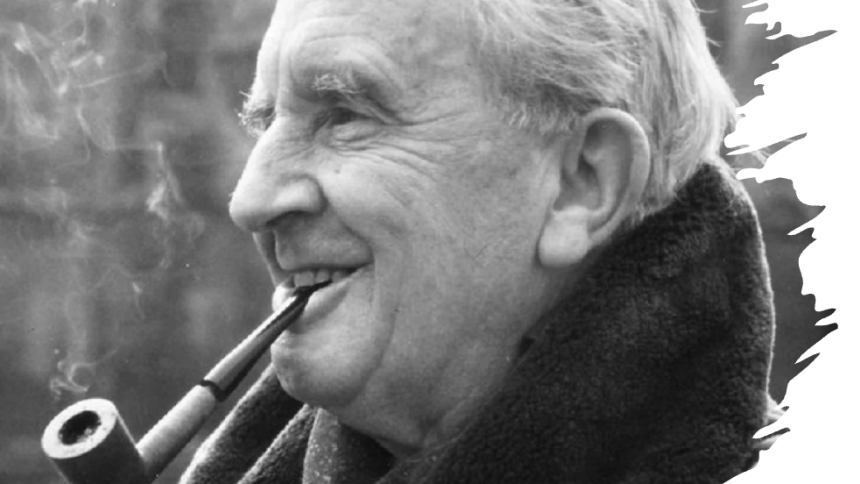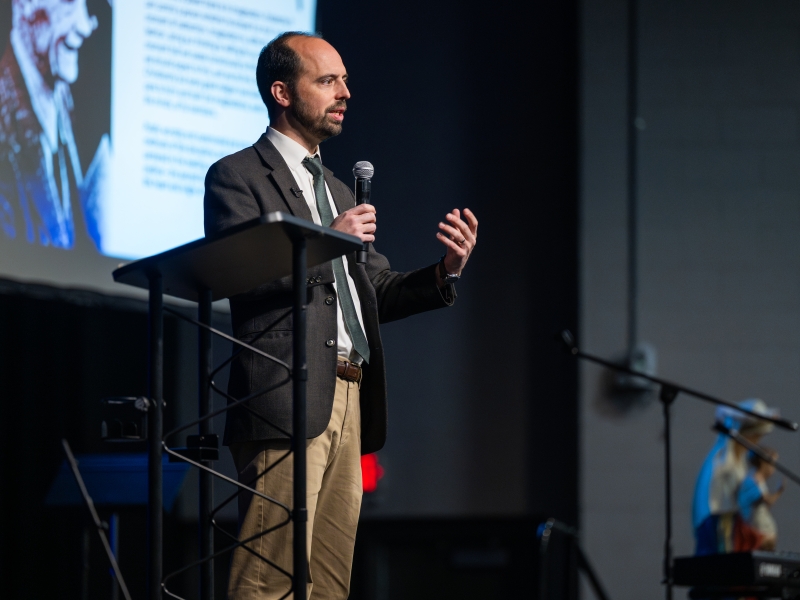
If we want to give our children the best start in life, we should help them to fill their young imaginations with the lofty things of God as lived and learned through the liturgy and prayer of the Church.
That was the advice given by Dr. Ben Reinhard, author of The High Hallow: Tolkien’s Liturgical Imagination, to staff drawn from parishes across the Diocese of Lansing who gathered for a day of formation at Saint Patrick in Brighton, October 24, entitled “Tolkien & First Sacraments”.
“Religion wants to train your imagination so that you've got the right things in the ‘lumber room of your mind’ and so that you desire and will and seek the good, public worship and ceremonial, the liturgy, are among the chief methods of this discipline,” said Dr. Reinhard, pictured below, who is Professor of English at Franciscan University of Steubenville, Ohio.
“Imagination can control a person, whether he knows it or not, in every moment of inattention, imagination is, after its own fashion, doing our thinking or willing for us in each moment that we cease consciously to think or will.”
Hence, proposed Dr. Reinhard, either we consciously inform the youthful imagination with noble things or the youthful imagination will be informed by random and, potentially, ignoble influences.
By way of an example, Dr. Reinhard held up the life and work of the great 20th century English writer, J.R.R. Tolkien (1892 – 1973), author of The Lord of the Rings, pictured above.
“It's not an exaggeration to say that the liturgy dominated Tolkien's life about as much as you could ever hope to find in a layman,” he said.
Dr. Reinhard charted the life of Tolkien from his birth into an Anglican family in South Africa; the untimely death of his father which coincided with the family’s relocation back to England; the familial ostracization of his mother after converting to Catholicism; and his guardianship under Father Francis Morgan of the Birmingham Oratory following his mother's death.
“Tolkien says that under Father Morgan's guardianship, he and his brother became functionally ‘junior inmates’ of the Oratory House, sort of little boy scout Oratorians,” he said.
“So, every morning before school, they would wake up and they would serve Mass, and then they would have breakfast with the fathers, and then they would go off to school, before coming back and repeating the same thing, time and again, throughout their childhood years.”
This immersive childhood experience formed a “liturgical imagination” in the mind of the young Tolkien that would deeply inform his personal and professional life in later years.
To make his point, Dr. Reinhard referenced a 1944 letter sent by Tolkien to his son, Christopher, who was serving with the Royal Air Force in South Africa during the Second World War. It read:
“If you don't do so already, make a habit of the 'praises.' I use them much (in Latin): the Gloria Patri, the Gloria in Excelsis, the Laudate Dominum; the Laudate Pueri Dominum; one of the Sunday psalms; and the Magnificat…If you have these by heart you never need for words of joy.” (J.R.R. Tolkien, Collected Letters, ed. Humphrey Carpenter, p. 66.)
“This is extraordinary stuff,” said Dr. Reinhard explaining the paternal advice thus, “You should memorize these things so that when joy strikes your life you can give fitting words to it, because how are you going to improve on ‘Glory to the Father and the Son and the Holy Ghost’ or improve on ‘Glory to God in the Highest’? You can't! So, you just make these words your own, you internalize them, you interpret your life, you interpret your own experience in the light of the Church at prayer.”
"This is a very, very lofty goal, the idea that the prayer and the rhythm of the Church can become the basic operating system for a human mind," added Dr. Reinhard.
Similarly, a "liturgical imagination" informed Tolkien’s writings including the date given in The Lord of the Rings for the destruction of The Ring, March 25.
“It's the date of the Incarnation, it's the Annunciation, it's God coming to the world but it’s also the Crucifixion as the traditional day of the Crucifixion is also March 25,” said Dr. Reinhard, “so when you have got Good Friday and the Annunciation together, you get Christ’s whole earthly mission condensed into one thing. And there we have it, March 25, which was also the beginning of the English New Year in the Middle Ages.”
The Liturgical Formation Day was organized by the Diocese of Lansing’s Office of Worship. The day was designed especially for those who accompany children and parents in their first encounters with Jesus in the sacraments of Baptism, First Holy Communion, and Penance.
Other speakers included Father Anthony Strouse of Saint Matthew in Flint; Hannah Marconeri of Saint Robert Bellarmine in Flushing; and Richard Budd, Director of Marriage and Family Life for the Diocese of Lansing.
* To read Dr. Ben Reinhard's book, “The High Hallow: Tolkien’s Liturgical Imagination”, go to: https://stpaulcenter.com/store/the-high-hallow-tolkiens-liturgical-imagination

